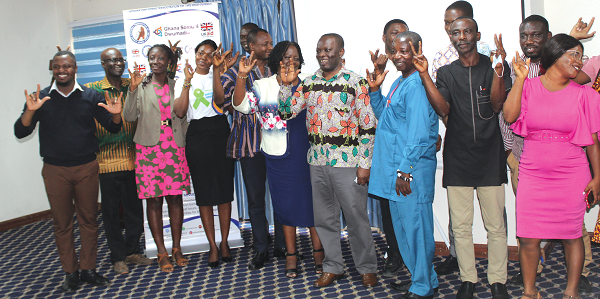The Ghana National Association of the Deaf (GNAD) has called on health authorities to ensure that healthcare workers receive in-service training to understand and care for deaf people, particularly those with mental health conditions.
According to the association, a lot of deaf people did not receive appropriate mental health care due to the communication barrier that existed between healthcare professionals and deaf people.
“We recommend that the Ministry of Health and the Ghana Health Service prioritise placing healthcare staff who are fluent in the Ghanaian sign language at some mental health services delivery centres to ensure effective mental healthcare delivery,” a Principal Investigator with a research project on mental health at the Kwame Nkrumah University of Science and Technology, Dr Wisdom Kwadwo Mprah, noted.
He said health authorities must factor into health policies and programmes the unique needs of deaf people to reduce the stigma and negative attitudes towards them.
Dr Mprah added that the current Mental Health Policy and Mental Act must also be reviewed to capture the needs of deaf people.
“There is also the need to improve mental health literacy among the deaf population to help them do self-assessment to facilitate help-seeking behaviours among them,” he noted.
Study
Dr Mprah made this known when he delivered findings of a study on the topic: “Assessing the knowledge of mental health issues and barriers to mental health services among deaf people in Ghana” in Accra last Wednesday.
The study was aimed at assessing, among others, the mental healthcare needs of deaf people in Ghana, the level of knowledge of deaf people on mental health conditions and related support services in four project regions in Ghana.
“The study also examined the coping strategies of deaf people with mental health conditions and their families,” he said.
Th research was conducted by the GNAD with technical support from Ghana Somubi Dwumadie and funded by UKAID.
Finding
In view of the research, Dr Mprah said the study population was made up of members of the GNAD, mental health professionals, civil society organisations (CSOs), deaf persons with mental health conditions and their caregivers.
He said 527 participants were sampled from the Upper West, Northern, Central and Greater Accra regions.
Dr Mprah indicated that findings from the study revealed that some participants expressed the belief that visiting the hospital, prayer camps or spiritualists would not change their situation.
He indicated that majority of them got information on mental health services on TV, internet, teachers, deaf friends, family and GNAD, adding that healthcare professionals were not mentioned.
“For all the respondents, regardless of their educational level, the major source of information was friends. The least source of mental health information is the church or the mosque,” he said.
The challenges mentioned by the participants included marital issues such as divorce, rejection, poor treatment by family members, mistreatment at the workplace and poor attitude from health workers.
The National President of the GNAD, Matthew Kubachua, thanked partners for their support while urging GNAD to advocate legislations and policies that would protect deaf people with mental health conditions from discrimination.
“Health research must target deaf people and also reports must be disaggregated by type of disability so that the needs of each group will be visible for mental health policy making and programme designing,” he said.

